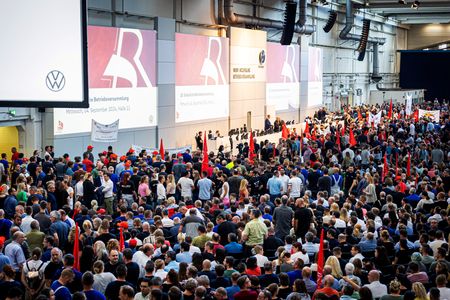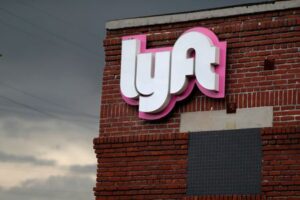By Victoria Waldersee and Christina Amann
WOLFSBURG, Germany (Reuters) -Volkswagen has “one, maybe two” years to turn its main car brand around, its finance chief said on Wednesday, as the auto giant weighs its first-ever plant closures in Germany and its powerful unions threaten a fight.
Delayed for several minutes when he took to the stage as staff whistled and shouted “Auf Wiedersehen” – German for ‘goodbye’ – Arno Antlitz appealed to the joint responsibility of staff and management to cut spending if the brand is to survive the shift to electric cars.
To a packed hall of thousands of workers and more outside watching on a screen, Antlitz said Europe’s car market had shrunk after the pandemic and the company was facing a shortfall in demand of about 500,000 cars, equivalent to about two plants.
“The market is just not there,” he told the meeting at Volkswagen’s Wolfsburg headquarters. He added he did not expect sales to recover and that the core VW brand had “one, maybe two” years to cut spending and adjust output.
The comments reflect mounting challenges for Europe’s car giants, including Stellantis and Renault, amid high labour and energy costs as well as rising competition from lower-cost Asian rivals shipping more cars to the region.
In response, works council chief Daniela Cavallo said management had “massively damaged trust”, and compared its threat to close plants to a “declaration of bankruptcy”.
Cavallo urged CEO Oliver Blume to explain why the group was prioritising spending on a 5-billion-euro software partnership with U.S. start-up Rivian over protecting German jobs.
The prospect of site closures at one of Germany’s most storied companies has raised more red flags for Europe’s largest economy, which is battling weak export demand and high costs.
Fresh from a drubbing in regional elections that saw a surge in far-right support, Chancellor Olaf Scholz has made Volkswagen a top priority, a source familiar with the matter said.
Labour Minister Hubertus Heil promised support, telling RTL/ntv that “Germany must remain a strong car country”. He did not give details but Scholz’s cabinet on Wednesday agreed tax measures to boost demand for EVs, which has lagged expectations, a source familiar with the matter said. His Social Democrats may also lobby the government for support on energy prices.
Late last year, the three-way coalition prematurely ended a subsidy scheme to boost demand for EVs.
Underscoring the tough backdrop, business sentiment in the German automotive industry slid further into negative territory in August, the Ifo economic institute said on Wednesday.
Volkswagen, whose brands also include Audi, SEAT and Skoda, said on Monday it was considering closing factories in Germany and ending a job guarantee at six of its plants in a drive to deepen a 10 billion euro ($11 billion) cost-cutting plan.
It is targeting a 6.5% profit margin at the VW brand by 2026, up from 2.3% in the first half of this year. The brand accounted for the majority of group car production last year.
Blume’s decision to challenge the unions is a departure from his image as a team player who keeps labour on side.
Some investors and analysts speculated the spectre of plant closures could be a negotiating tactic to get rid of job guarantees and drive down wage demands.
“He definitely won’t manage to get rid of job guarantees, cancel wage increases and close plants. But we can’t rule out that he will manage one or two of those goals,” said Moritz Kronenberger, portfolio manager at VW shareholder Union Investment.
Still, union representative Thomas Knabel said there would be no talks unless Volkswagen took plant closures off the table.
“I cannot imagine negotiations that would work under the Damocles Sword of plant closures,” he said.
While management blamed financial pressures on a worsening German economy and new competitors, unions said the carmaker’s production strategy was inefficient and decision-makers had been too slow in investing to produce a mass-market electric vehicle.
Whatever the cause, the company must make quick decisions about where to cut costs, investors and analysts said – a challenge for a firm of its size and with a complex power structure formed over its 87-year history.
“In difficult times, management and unions have an ability to get to consensus,” Jefferies analyst Philippe Houchois said. “But it’s not going to be smooth.”
($1 = 0.9058 euros)
(Reporting by Victoria Waldersee, Christina Amann, Andreas Rinke; Writing by Victoria Waldersee and Matthias Williams; Editing by Jamie Freed and Mark Potter)





